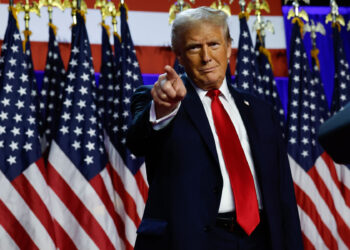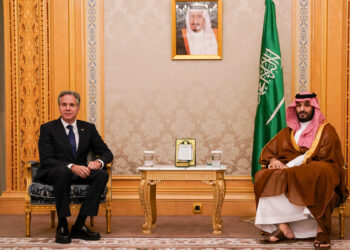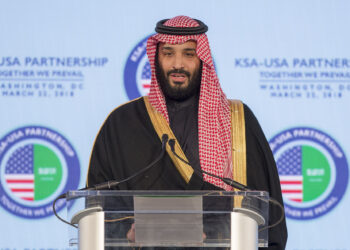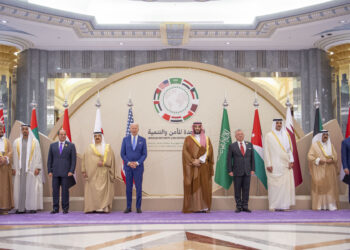Omid Memarian, a journalist, analyst and recipient of Human Rights Watch's Human Rights Defender Award, is the Director of Communications at DAWN.
عربي
Born into a Palestinian family in Haifa and raised in an orphanage in Israeli-occupied East Jerusalem starting when she was just five years old, Rula Jebreal at an early age saw firsthand the denial of certain people's basic rights. "Regardless of the fact that some of my family members had an Israeli passport, because they were born inside Israel in Haifa—others were born in East Jerusalem—we were treated as second-class citizens, or even worse," she recalls. "We were all under military occupation in some form or another." She remembers the "humiliation" that her father faced when he would be stopped constantly by Israeli police or soldiers, like so many other Palestinians.
"All of that made me become much more sensitive to issues of human rights, women's rights, minority rights, justice and democracy," she said in a recent interview with Democracy in Exile. "It was clear, all across the Middle East, that the kind of authoritarian rule that was enabled by foreign powers was the reason why there was no hope and they could not produce anything except mass unemployment, desperation and radicalization."
Her father, a Sufi imam at al-Aqsa mosque, put her and her younger sister in Dar al-Tifl, a Jerusalem orphanage that was home to 3,000 girls, after their mother's death. The orphanage was run by Hind al-Husseini, the Palestinian woman who had founded it in the aftermath of 1948. "She dedicated her life to raising and educating girls and women," Jebreal says. "She wanted to leave a next generation of girls and women who could actually empower their communities. Imagine if we could have done that across the world." Jebreal's semi-autobiographical novel, Miral—which tells the story of Hind al-Husseini and Dar al-Tifl—was adapted into a film in 2010. She wrote the screenplay.
Today, Jebreal is a foreign policy analyst, author and visiting professor at the University of Miami. A frequent commentator on U.S. foreign policy, she spoke to Democracy in Exile following the U.S. withdrawal from Afghanistan and against the backdrop of the 20th anniversary of 9/11. America's goals in Afghanistan, she says, "were never about democracy, except when you were talking to an American audience. It was never about bringing gender equality to these countries." Instead, the trillions of dollars in Afghanistan were spent propping up an autocratic regime, first under President Hamid Karzai and then under President Ashraf Ghani, after the Taliban "went underground and hid in neighboring countries."
The American failures in Afghanistan and the wider "war on terror" have reverberated back in the United States, with Donald Trump's presidency and culminating in the Jan. 6 assault on the Capitol in Washington by his extremist supporters. "This is the war on terror coming back home to haunt us all, directly and indirectly," Jebreal says. "What you see is a full circle of the war on terror in 20 years."
"Authoritarianism didn't stay in the Middle East—it came back to haunt America's democracy itself," she warns. "If people don't connect the dots, we're going to relive this cycle over and over again. It's time to wake up."
The following transcript has been edited lightly for clarity and length.
What does the Biden administration's abrupt withdrawal and evacuation from Afghanistan tell us about overall American foreign policy?
Just to be clear, we have to understand, how did we get here, in order to understand this botched exit. There's no hiding from the fact that this was a botched exit operation, but how did Biden reach this point? We need to be really objective here. In 2018, the Trump administration started negotiations and then signed an agreement with the Taliban. The agreement was the following: full withdrawal from Afghanistan and releasing of 5,000 prisoners, in exchange for what? Nothing. Nothing. Basically, don't shoot us. That was a Trump surrender deal. They dismantled Bagram Air Base, and since that day, the game was over.
By the time Biden came into office, there were two mechanisms in place. There was an agreement he needed to abide by, meaning get out of there. And there were only 2,500 soldiers that they couldn't keep in a country of 38 million. And so, he started the withdrawal, gradually. There were multiple roadblocks. The main one was the [Special Immigrant Visa] program that President Obama put in place [for Afghans who worked for or on behalf of the U.S. government], which was blocked and botched by President Trump, because of his racist, xenophobic, white supremacist views. So you could not evacuate Afghans, especially our allies, interpreters, activists, journalists—all the people who worked with the Americans for 20 years, helped them, and will be butchered by the Taliban. All of these people could not be evacuated because there were new rules about how to take people out.
By the time he came into office, Biden was facing multiple challenges: climate change, COVID. Clearly his agenda was "America is back"—but it's back when it comes to domestic policy. Remember, there was the Jan. 6 terrorist attack on the Capitol, so they were handling multiple things simultaneously. I don't think he was focused [on Afghanistan], and he relied on the intelligence at the Pentagon and the State Department.
I think the real failure was one of communication—to communicate to the people of the United States, the American public, what was happening in regard to the Trump withdrawal. Another thing he did not talk about was not only why we're leaving, but also why we will have problems leaving, especially with the visa program. I think there was a huge communication issue. Plus, he discovered what we all knew: that our media establishment, when it comes to domestic policy, they're progressive, they're pro-democracy, pro-multicultural democracy in America—but when it comes to brown, black, Muslim people overseas, they actually endorse authoritarianism. The proof of that is in the pudding.
Look at every article that has been written about every dictator in the Middle East. MBS, the crown prince of Saudi Arabia, who was torturing people and killing people, was called a reformist. People were saying about the war on terror that we need to go there, and tell these Muslims, or these brown people, "Suck on this." That was the approach. So we have a serious problem when it comes to our colleagues, especially newsrooms who lack diversity. You might not be a racist in America, but when it comes to these other brown people, they call themselves realists, but that's not realism—they don't care about human rights, they don't care about real democracy in the Muslim and Arab world. They don't care about Afghans, Iranians or Palestinians.
Nobody mentioned that in 2019, 7,400 bombs were dropped in Afghanistan. Tons of bombs were dropped in Yemen and elsewhere across the Middle East. Nobody cared about that. We keep grooming these authoritarian rulers, these dictators—al-Sisi, MBS, MBZ—regardless of the fact that these people are exporting their strain, their brand of authoritarianism all over the world. Not only in the Middle East, but here in America.
"We're witnessing again a revival of history—of the dark, fascist history, globally. The war on terror played a huge role in that."
- Rula Jebreal
Are there any lessons learned here for the U.S.?
The media needs to be much more diverse. I think the administration needs to communicate clearly about its failure—but also, about how we got here, to be honest with the American people. Give them the total honest truth about Trump, the Taliban deal, the visa program. Communicate strategically with minorities, try to be more progressive about foreign policy and, above all, listen to people in the region. If you're listening to Thomas Friedman in The New York Times and David Brooks, and all of these ambassadors who work for these companies—whether it's Pegasus, with this spying technology, or others. These are your advisers? You create this ecosystem, this echo chamber, a monologue among yourselves. You need to include challenging, diverse voices in order to understand the reality on the ground.
Another lesson that I hope we learn is that these thoughtless Republicans, they will try to rewrite history, but they are to blame for the war on terror. Bush started this based on a lie in Iraq. And now they are complaining about refugees after they destabilized their countries. Don't let them off the hook.
The third lesson, which is for me the most important: Biden said that he believes in democracy and defending democracy and human rights. These are not words people listen to around the world. You need to empower. Once and for all, empower civil societies, whether you spend on education, scholarships, empowering girls and women, protecting and defending minorities, and American values. If we spend 1 percent of the Pentagon budget on these issues—I mean, you look around the Middle East, and you see who is winning elections when you have free elections, which is a rare thing? Only the members of civil societies, only the people who try to help the most vulnerable, the most poor. Our Afghan allies that we need to evacuate and resettle, these people will help us understand how to move forward in Afghanistan—how to move forward and deal with the Taliban and ISIS and al-Qaida. These are the best assets. Our intel is not CIA agents across the Middle East that might or might not speak the language, or some analyst in The New York Times. Our best people—our best hope—is to empower people on the ground, but also to evacuate our allies, who can become our best sources to understand the challenges to come.
How might the Afghanistan fiasco affect the United States' standing in the world and, in particular, in the Middle East?
It absolutely depends on what we do with the refugees. I think this is a crucial point. The world will not judge you on the withdrawal. The world knew that, sooner or later, the U.S. would leave. Somebody was saying that the Taliban had the time, America had the watch. The Middle East had the time. They knew. What will affect our reputation is the people we would promise to resettle, to save, to evacuate—that is what will affect us, because nobody will trust us if we abandon these people.
Another thing is that when it comes to the challenges to come, if we leave certain areas but we stop negotiating—Trump negotiated with the Taliban, he talked to them. China, Russia and Iran are talking to them. It's time to bring diplomacy back to the table. You talk to the people you hate the most maybe, but those are the people you need to have an agreement with. [Otherwise], you're isolated. You're not isolating the world, you're isolating yourself. It's time to bring diplomacy back to the table.
Biden needs to rejoin the Iran deal now more than ever. They need to push the Israeli government to concede on democracy and human rights. If they want to have all of the country, then give Palestinians equal rights and voting rights, because you cannot have it both ways. You cannot have apartheid in the 21st century.
Biden shouldn't be defined by what Trump and Bush have done. He needs to be defined by how he sees the world. If Biden wants to defend democracy and human rights, then do it. It's time to do it. Rejoin the Iran nuclear deal, and negotiate with the Israelis—push them, condition the U.S. aid to respect human rights and democratization, end apartheid. One of the main issues for America is that you cannot be hypocritical anymore. You cannot say you are pro-democracy but then your allies are an apartheid state, a murderous regime, a dictator in Egypt. We can't have it both ways. It's time to choose. And this is the time of truth.
In the coverage of the Kabul airport evacuation, and in the aftermath of the brutal suicide attack that led to the death of more than 180 people, including 13 American soldiers, the Western media's focus, once again, was on the American losses. What does this narrow coverage miss in regards to the consequences of mismanaged U.S. foreign policy?
We need diverse voices in newsrooms and news media. My heart breaks for the families of these soldiers. Some of them were in their 20s, which means they spent their entire lives in the war on terror, and they died trying to end it. And yet to see these generals who failed all of us on television—and no Afghan people, no women, few journalists and few critics, and few people who are real experts because their views are inconvenient or maybe harsh—makes me sick to my stomach. That means the media has failed as well and continues to fail. And this is why we are here. We need to have a moment of reckoning, whether it's the foreign policy establishment, our colleagues in the media, or policymakers. We need to have a reckoning and understand how we all together failed. I feel a huge responsibility because I know the region, I came from the region, and I'm here trying to speak and tell our media in the U.S. to create some kind of awakening, because we need them to start understanding that, without these critical voices and minority voices, we will keep rewriting the story that is an alternative reality, not the reality that took place in the last 20 years.
"Authoritarianism didn't stay in the Middle East—it came back to haunt America's democracy itself."
- Rula Jebreal
A federal appeals court recently ruled that the CIA and other intelligence agencies must not be required to confirm or deny the existence of records indicating the United States' awareness of threats to U.S.-based journalist and Saudi critic, Jamal Khashoggi, ahead of his 2018 murder. The U.S. court wrote in its opinion that revealing whether such documents existed would "reasonably be expected to result in at least serious damage to national security." What's your take on this? Has the U.S. done enough in holding the Saudi government accountable?
Enough? Really? Not when MBS' henchmen are still free. What kind of justice is that? We did not do enough to hold any of the Saudi regime accountable, especially the guy that ordered the murder. He is still the ruler, and he will continue killing people left and right. Because by ruling like this, he is emboldened and knows he can get away with murder. He already knows he can get away with murder. He already got away with murder. And we have a former president defending him, then leaking information to a journalist, Bob Woodward—"I saved his ass," excuse my language.
Fifteen of the nineteen hijackers on 9/11 were Saudi nationals. We know that they pumped millions of dollars, year after year, into the global jihadist movement. We never held them accountable for that. So, I'm not surprised that we will never hold them accountable for anything, because it's never about human rights. It's never about democracy. It's about who benefits from Saudi wealth. And guess what? A lot of the lobbyists in Washington D.C. benefit, and a lot of lawmakers. Sadly, a lot of think tanks are bankrolled by the Saudis and the Emiratis. A lot of foreign policy does not reflect our values, it reflects who pays those institutions. And this is a travesty.
From Afghanistan to Libya, to Iraq, to Syria, American interventionism has not achieved its intended foreign policy goals.
Actually it did. What were the foreign policy goals? If the foreign policy goals were the rhetoric around democracy and women's rights, those were lies. We told ourselves lies for 20 years. They told us lies for 20 years. The real goals were to go there and tell these people, "Suck on this." Thomas Friedman, when he gave that interview [in May 2003, about the war in Iraq], he said what our goals there were. He said go there and hit them as hard as you want, regardless of the consequence.
It has also reared massive human costs, for multiple generations. How could this chain of U.S. failures abroad impact the liberal international order?
Oh, it destroyed it. It really destroyed a lot of its components. There were two visions after World War II, one of freedom and democracy and one of authoritarianism. They conflicted, creating the Cold War and arguments about who was on this side and who's on the other side. Now we're finding ourselves, yet again, trying to revive democracy. There's an existential threat, and it's the autocratic, authoritarian, racist, xenophobic movements globally trying to wage war everywhere on democracy. The Jan. 6 terrorist attack, led by Trump and his Republican Party allies in Congress, with their thugs assaulting Congress, was one of the peaks of how the international order has failed in defending and expanding democracy. And I think people did not realize—if you look at the poll numbers of the far right in Italy, in Spain, Germany, all of them might win elections, might rule the country. Trump's allies all over Europe are on the rise, and if they capture one or two nations in Europe, they can destroy the European Union.
I'm telling you, we're witnessing again a revival of history—of the dark, fascist history, globally. The war on terror played a huge role in that. Because those same people who started the war, who destabilized countries, who created the huge catastrophic human consequence with millions of refugees—now they're inciting violence against these refugees and using them as a weapon to seed fear, paranoia and hate. I believe that the only ones that benefited and succeeded and are somehow the winners of the war on terror are the global fascist movement, or Trumpist movement, and the jihadists.

In April, Human Rights Watch said in a report that Israeli actions in the West Bank, East Jerusalem and the Gaza Strip "are so severe that they amount to the crimes against humanity of apartheid and persecution." On the campaign trail, Biden had said that human rights would be the pillar of his administration's foreign policy. How should this promise apply to Israel?
If you look at the Israeli reality, you look at the murder of Prime Minister Yitzhak Rabin in 1995, the only prime minister that really ever attempted any diplomatic resolution with the Palestinians. Today, people like Naftali Bennett keep inciting against any diplomatic resolution with the Palestinians, or with the Iranians, or with anybody in the region, except with the two murderous thugs in the Middle East, MBS and MBZ. But obviously, it's not a diplomatic resolution aimed to expand democracy or protect human rights. It's about an alliance—anti-Shia, anti-Iran—to buy and sell weapons. It's an arms deal. It's not really a diplomatic resolution. And the U.S. has been complicit in Israeli crimes. We finance Israel with nearly $4 billion dollars [annually], while we've been ignoring their policy of apartheid and defending them diplomatically in the United Nations. So, we are complicit. We are part of the system that destroyed Palestinians lives. I don't know if Palestinians can survive at this point. I believe that we might. The people of Palestine are fighting for their existence and continuation as a nation, and I see a very bleak future regarding that.
Do you see any changes in Israel and Palestine over the next four years with what this administration is doing?
I think we're witnessing a slow genocide. How many children are being killed on a daily basis, homes destroyed, livelihoods and lives, pushing Palestinians more and more into desperation? Basically blockading them in Gaza as if it were some kind of plantation, or the last open-air prison, so you can bomb them whenever you want and violate any international laws with the kind of superpower behind you. Anybody who read the 9/11 Commission, if you read their remarks about what are the causes, they thought Palestine wasn't an issue—the impact of the Palestinian issue on people across the Middle East, on their minds and on their hearts. The rulers and leaders might not talk about that, especially Arab and Muslim leaders, but guess what? In every Arab home, it's viewed as the injustice of their lifetime, of their region, and they point out that as the hypocrisy of America and the West. So where do I see us moving in that direction? Nowhere. I don't think Biden will do anything. He will continue a policy of lip service. But then he will continue financing Israel and defending them in the U.N. And that's it.
Why has the progressive community in the U.S. been so silent about this?
Because they've been silent about Yemenis, Pakistanis, Iranians and Afghans. Because it boils down to the main question. I don't think that most of the progressive establishment, except the minority—AOC, Ayanna Pressley or Rashida Tlaib—are outspoken. This is because they come from a minority background, because they witnessed oppression and segregation and racism. They have a vested interest in talking about these issues, unlike the majority of the wider progressive folks who really don't care about Palestinian or Iranian lives, human lives outside of their realm of communities. For them, if Israel would do what they're doing to the Germans, there would be an uproar. Or to a Norwegian, or the British. But to do it to brown, black, Palestinian, Muslim? They don't care. They might not be racist at their core, but they don't mind racist policies toward these people.
Who do you think is going to pay the bill for the U.S. war on terror?
No one. They lied in Iraq and destroyed the country. Nobody paid the price. Dick Cheney is still here, he's now talking about democracy in the U.S., and George Bush is still here. There is no accountability whatsoever for any of their former lies. Why should there be any now? There is never any accountability with these people. Look at Trump! He waged a war on the U.S. Constitution, there's no accountability even for him. Republicans defended him, even against a second impeachment. I don't believe there will ever be accountability.
Executive Editor Frederick Deknatel contributed to this interview.







